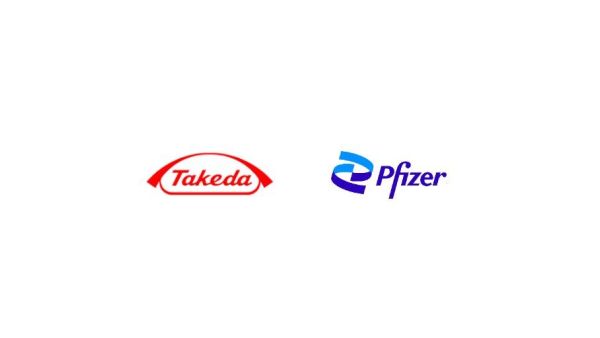Takeda and Pfizer Announce Four-Year Results from Positive Phase 3 HD21 Trial of Additional ADCETRIS® (brentuximab vedotin) Combination in Frontline Hodgkin Lymphoma

OSAKA, Japan & CAMBRIDGE, Mass. & NEW YORK--(BUSINESS WIRE/AETOSWire)-- Takeda (TSE:4502/NYSE:TAK) and Pfizer (NYSE: PFE) today announced that the German Hodgkin Study Group (GHSG) will present positive results from the Phase 3 HD21 trial evaluating ADCETRIS® (brentuximab vedotin) in combination with chemotherapy as a late-breaking oral presentation at the 60th American Society of Clinical Oncology (ASCO) Annual Meeting (LBA7000) and at the 29th European Hematology Association (EHA) Annual Meeting (S225). The four-year analysis presented by the GHSG showed superior progression-free survival (PFS) and improved tolerability for patients compared to a current standard of care regimen used in Europe in this setting.
The HD21 study is a Phase 3, randomized, multi-country, prospective, open-label study, sponsored by the GHSG and supported by Takeda, designed to evaluate ADCETRIS in combination with etoposide, cyclophosphamide, doxorubicin, dacarbazine and dexamethasone (BrECADD) in comparison to a standard of care treatment – escalated doses of bleomycin, etoposide, doxorubicin, cyclophosphamide, vincristine, procarbazine, prednisone (eBEACOPP) – in patients with newly diagnosed Stage IIb/III/IV classical Hodgkin lymphoma. At a preplanned three-year analysis, the study met its co-primary endpoints, with the ADCETRIS combination regimen demonstrating significantly improved safety as assessed by treatment-related morbidity (TRMB) and non-inferior PFS.
The study found that the addition of ADCETRIS to this chemotherapy regimen improved the risk-to-benefit profile of the combination treatment, maintaining efficacy with significantly fewer acute and long-lasting treatment-related toxicities than the comparator arm.
“We initiated the HD21 trial with the hope of improving outcomes currently being achieved by a standard of care, as many patients with newly diagnosed disease often experience a high treatment burden,” said Peter Borchmann, MD, PhD, University Hospital of Cologne, Germany, and trial chairman of the HD21 study. “The presented analysis, in which the ADCETRIS regimen demonstrates superior progression-free survival, as well as a tolerable safety profile, reveals the meaningful potential this ADCETRIS + ECADD regimen has to offer these patients.”
The ASCO presentation provides details of a four-year PFS analysis of the HD21 study conducted by GHSG. After 48 months, BrECADD showed superior efficacy to BEACOPP (94.3% PFS for BrECADD and 90.9% PFS for eBEACOPP; hazard ratio [HR]: 0.66 [95% CI:88.7-93.1]; p<0.035). As previously reported in the three-year analysis, treatment with BrECADD was also associated with a significant reduction in the incidence of TRMB compared with BEACOPP (n=738; 42% vs 59%; p<0.001), as well as clinically meaningful reductions in adverse events (AEs). The safety profile of ADCETRIS in patients receiving BrECADD remained consistent with other approved ADCETRIS combination regimens, and no new safety signals were identified.
“In our ongoing effort to improve outcomes for patients with lymphoma, we’ve partnered with the GHSG on the HD21 study to deepen our understanding of how ADCETRIS could further benefit patients in need of new options,” said Awny Farajallah, chief medical officer, global oncology at Takeda. “We are excited about the impact these results could have on patients with newly diagnosed Hodgkin lymphoma, potentially bringing them an additional ADCETRIS-based combination regimen that may significantly reduce side effects without compromising on efficacy.”
Takeda will be responsible for submission of potential regulatory filings based on the HD21 study outside of the U.S. and Canada. Under the terms of the collaboration agreement, Pfizer has U.S. and Canadian commercialization rights and Takeda has rights to commercialize ADCETRIS in the rest of the world.
Background Information
Pfizer
At Pfizer, it applies science and its global resources to improve health and well-being at every stage of life. It strives to set the standard for quality, safety and value in the discovery, development and manufacturing of medicines for people and animals. Its diversified global health care portfolio includes human and animal biologic and small molecule medicines and vaccines, as well as nutritional products and many of the world’s best-known consumer products.
Every day, Pfizer colleagues work across developed and emerging markets to advance wellness, prevention, treatments and cures that challenge the most feared diseases of its time. Consistent with its responsibility as the world’s leading biopharmaceutical company, it also collaborate with health care providers, governments and local communities to support and expand access to reliable, affordable health care around the world. For more than 150 years, Pfizer has worked to make a difference for all who rely on them.






